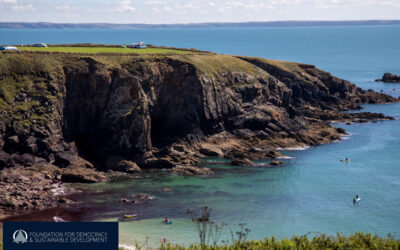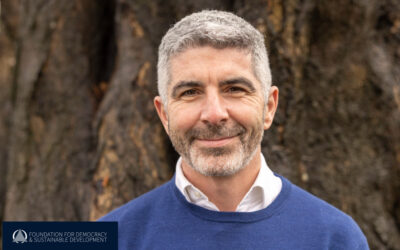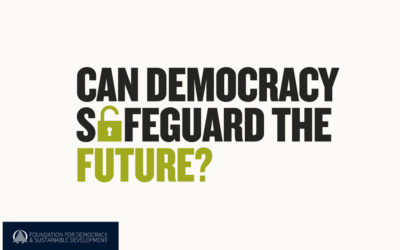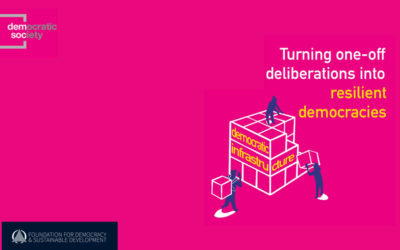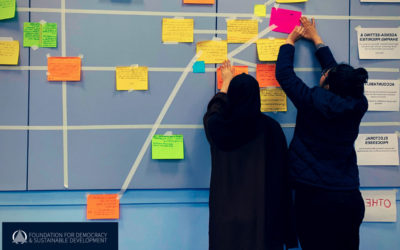Roman Krznaric’s new book, The Good Ancestor: How to Think Long Term in a Short-Term World, explores six ways we can expand our time horizons to confront the great long-term challenges of our age, from the climate crisis to threats from new technologies and the next...
Foundation for Democracy and Sustainable Development
We work in partnership to resolve the tensions between today’s liberal democracies and the challenges of creating a more environmentally sustainable and inclusive society, which enables wellbeing for all, now and in the future.
A call to do politics differently
FDSD has long supported the wider use of participatory and deliberative processes. Citizens’ assemblies for example have a vital role to play in kick-starting the tough steps needed to respond to the climate emergency, but the detail of how they will work is critical.
Public Participation
Knowledge Network on Climate Assemblies (KNOCA) launched
Climate Assemblies are increasingly being used in a variety of different European countries at different scales of governance to inform policy responses and social action on climate change. The European Climate Foundation has launched the Knowledge Network on Climate Assemblies (KNOCA) as a ‘go to’ place for those seeking considered, rigorous and widely-sourced input on their design and implementation. FDSD’s own Professor Graham Smith has been appointed as the founding chair of the network. —Read more.
Economics is for Everyone!
The economy is an area of decision-making fiercely protected by experts and politicians from public participation. But public confidence in this closed policy community is waning and arguments for democratic participation in an area that so profoundly shapes all our lives are growing. Here, Graham Smith is reflecting on his work with the RSA Citizens’ Economic Council. —Read more.
Pickering and the flood that didn’t happen
Citizen participation and its critics—John Lotherington reflects on the ongoing debate about the impact of the community-led flood defences in Pickering after the town was spared the flooding that hit large parts of northern England in late-2015.—Read more.
Thinking systemically about deliberative democracy and climate change
Deliberative democracy is a collaborative and effective way to develop the concerted, ambitious and creative action needed to respond to climate change. Drawing on his experience in organising mini-publics in Canada, David Kahane notes, that in order to achieve these aims, deliberative approaches need to adopt the tools of system design and thinking to enable people to better understand complex problems and implement action through experimentation and learning. —Read more.
Giving tomorrow’s citizens a voice today
What we do today affects our children, grandchildren and great-grandchildren. These future generations will have to live with the environments, economies and societies that we leave them – and we have a shared responsibility to pass on something worth having.
Future Generations
Future Generations Commissioners: Learning Lessons from Wales
Peter Davies offers personal reflections on his role in the development of the Future Generations Commissioner for Wales within the broader story of the journey of devolution—a journey that started with the duty to promote sustainable development in the initial Government of Wales Act. — Read more.
The Necessity and Powers of Future Generations Organisations
The imminent ecological crises and our consumer society’s lack of receptivity to this bad news mean that an independent, authentic voice is needed to represent the interests of future generations. Sándor Fülöp draws on his experience as Hungarian Ombudsman to explain the necessity and powers of a future generations organisation. — Read more.
Democratic Reform, Intergenerational Justice and the Challenges of the Long-Term
Philosophical essay by Simon Caney on the morality of prosperity, intertemporal politics and a re-imagination of our political life. — Read more.
What We’re Reading
#futuregen—Lessons from a Small Country | By Jane Davidson
In #futuregen, Jane Davidson explains how, as Minister for Environment, Sustainability and Housing in Wales, she proposed what became the Well-being of Future Generations (Wales) Act 2015 – the first piece of legislation in history to place regenerative and...
FDSD publications
Proposed Wellbeing and Sustainable Development (Scotland) Bill | FDSD submission
FDSD submitted a response to Sarah Boyack MSP on the proposed Wellbeing and Sustainable Development (Scotland) Bill on 24 March 2023. We highlighted the importance of adopting a long-term perspective in policymaking to ensure the wellbeing of current and future...
Renewing our democracy by placing people from all walks of life at the heart of decisions | Recommendations to Labour Policy Forum Inquiry
FDSD made a collective submission to the Labour Policy Forum on 17 March 2023 together with Involve, Demos, the Sortition Foundation, IsWe and Shared Future. In it we argued that since our current democracy is failing to tackle the big challenges of our time, we need...
Our People
The Foundation for Democracy and Sustainable Development is led by a group of trustees who are also directors of the company. The Chair of the board of trustees is Peter Davies.
The Challenge
At one level, the ideas and reality of sustainable development and democracy overlap and are interdependent. Common to both sustainable development and democracy is participation—the ability of all people to come together and be involved in decisions about how we live and the goals we want to achieve as societies. There are also tensions and differences between the two ideas which need to be resolved in order for current political democratic systems to adapt in the direction of achieving sustainable development.
News & Updates
Celebrate St David’s Day with FDSD’s Spring Newsletter
This newsletter is the second in a series exploring how sustainable development, future generations and wellbeing are being incorporated into democracy and public policy around the UK.
Wales—A Well-Being Nation
In this article, Derek Walker, Future Generations Commissioner of Wales, sets out his Office’s new seven year strategy, arguing that the WfG Act has to now “work harder and faster”, even though, at the same time as public finances, including his own office, are under severe pressure.
FDSD Newsletter, Autumn 2023
From national to local level, Scotland is rethinking how its policy, and participation practices, can better reflect sustainable development, wellbeing, and the needs of future generations. This FDSD newsletter showcases some of the activities that are happening, or are being considered.
Deepening Democracy for the Long Term | By Graham Smith
The public’s perspectives on future generations are highly structured by the context in which they are articulated. A long-term perspective is rarely taken by people when they make immediate and everyday decisions – with the exception of those motivated by ‘lifetime-transcending interests’.
Deliberative democracy and the just transition: from one-off activities to embedded participation | Winter Newsletter, 2022
FDSD has been quiet during COVID, but not inactive. We have been rethinking how we can best contribute to the profound challenges facing democracies today.
Democratic infrastructure: turning one-off deliberations into resilient democracies
Isolated deliberations cannot sustain resilient democracies. While they enable a momentary reinvention, improvement, or extension, they do not, inherently, enable the creation of continuous, strategic, and future capacities for strengthening and reimagining democracy.
Towards collaborative governance: Why innovation in deliberative democracy and the public sector must go hand in hand
Lukas Kübler, Giulia Molinengo and Monika Arzberger from the Collaborative Governance Lab in Germany argue that ‘collaborative governance’ may help reconcile the logic of public governance—accountability, hierarchy and control—with that of deliberative democracy—flexibility, horizontality and openness.
Why understanding what people think is crucial to the next phase of climate policy—Interview with Chris Stark | By Jake Ainscough
Jake Ainscough from the Climate Citizens project at Lancaster University interviews Chris Stark, CEO of the UK’s Climate Change Committee to explore the Committee’s recent experiments with deliberative engagement. He outlines where they are relevant, and how to overcome barriers to take up.
Brussels launches permanent citizens’ assembly on climate
The Brussels-Capital Region has announced that it will launch a permanent Citizens’ Assembly on Climate in 2023. Each year, the assembly will bring together 100 citizens to select topics, deliberate and come to recommendations.



